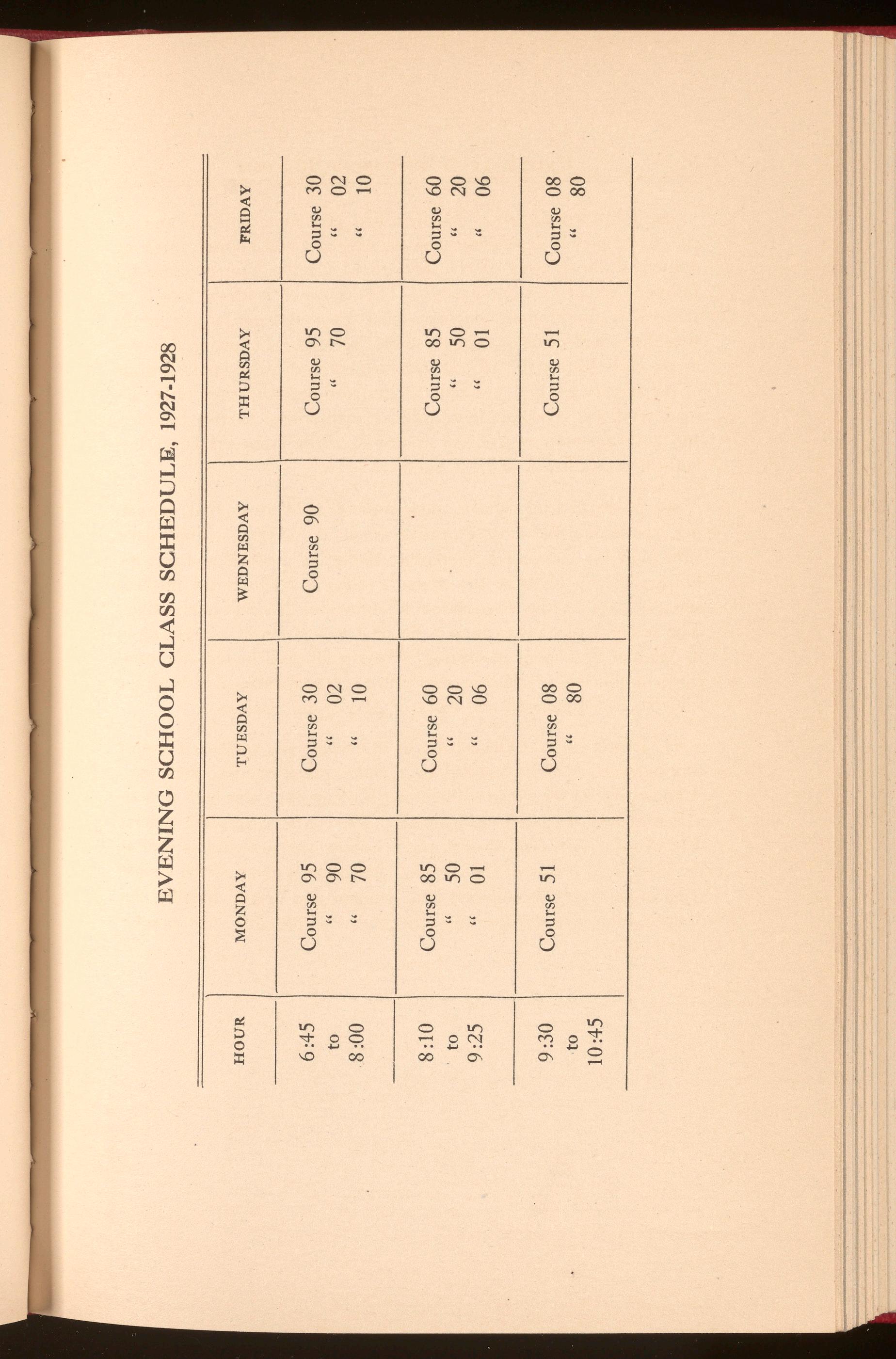University of Richmond
RICHMOND, VIRGINIA
Announcement of The Evening School of Business Administration 1927-1928
SESSION OPENS SEPTEMBER 14, 1927
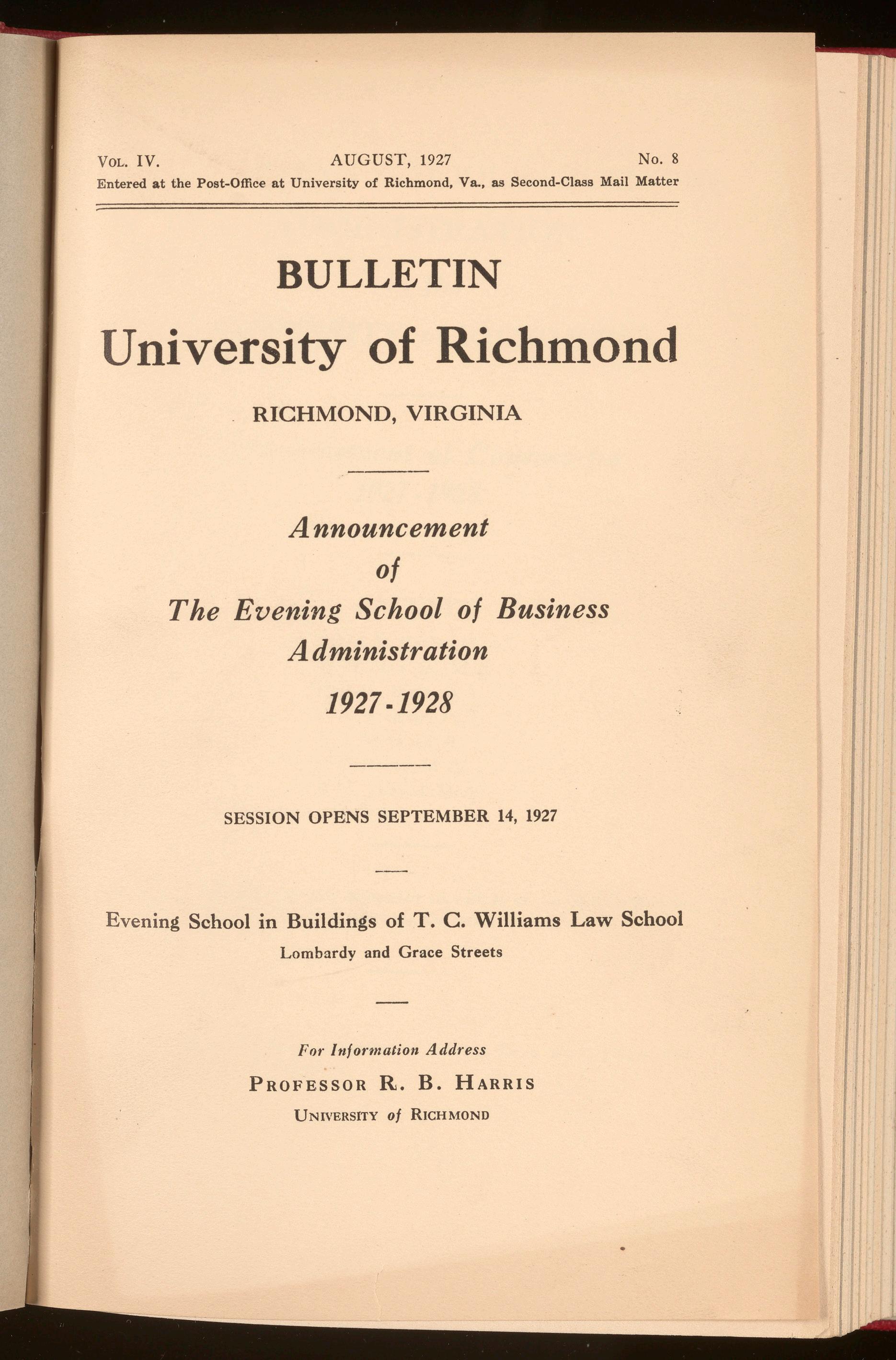
Eveni
PROFESSOR R. B. HARRIS
UNIVER

The EVENING SCHOOL of BUSINESS
ADMINISTRATION in the UNIVERSITY of RICHMOND
Announcement of Courses for 1927-1928
FACULTY
,RALPH B. HARRIS, M. A.
H. H. SEAY, JR.,M.A
HUGH s. MEAD, B. A.
R. A. STEWART,Ph.D
D. J. MAYS, LL. B.
L. E. DRURY, M A.
H. P. THOMAS, M. A.
Session opens Wednesday, September 14, 6 :30 P. M , in the Law Building , corner of Grace and Lombardy Streets, Richmond, Va .
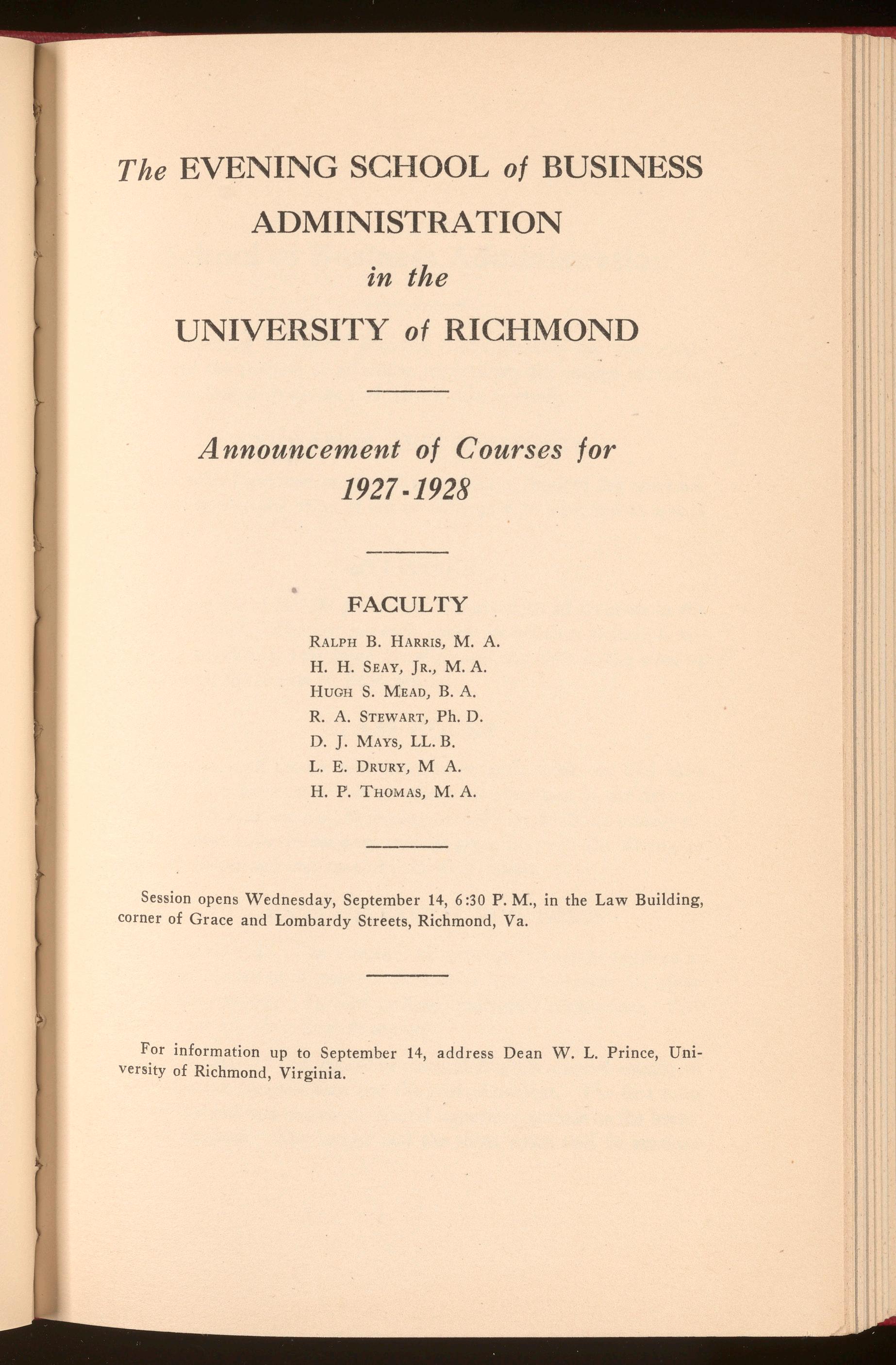
For information up to September 14, address Dean W. L. Prince, Universi ty of Richmond, Virginia.

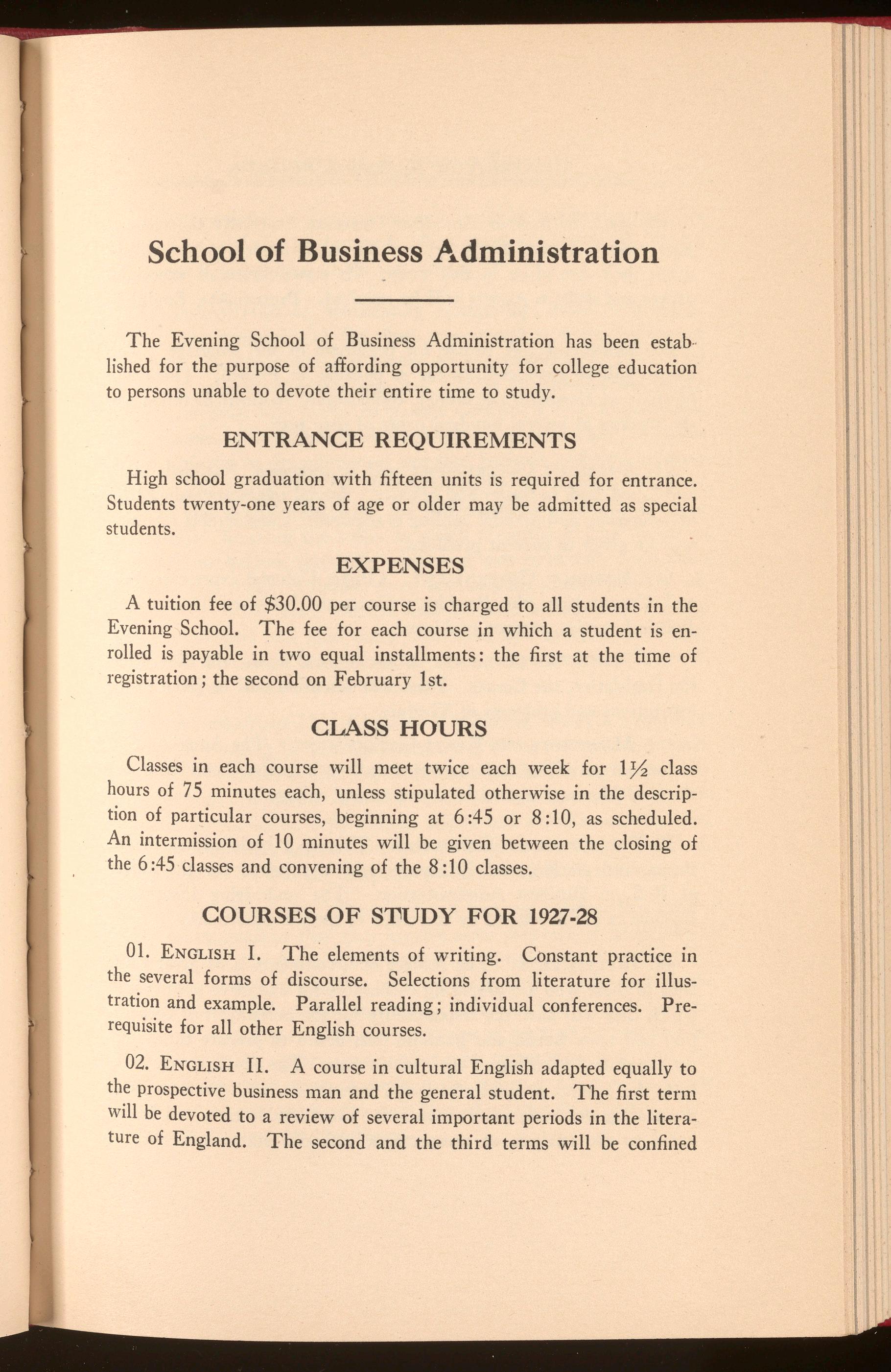
School of Business 1'...dministration
The Evening School of Business Administration has been estab -lished for the purpose of affording opportunity for college education to persons unable to devote their entire time to study.
ENTRANCE REQUIREMENTS
High school graduation with fifteen units is required for entrance. Students twenty-one years of age or older may be admitted as special students.
EXPENSES
A tuition fee of $30.00 per course is charged to all students in the Evening School. The fee for each course in which a student is enrolled is payable in two equal installments: the first at the time of registration; the second on February 1st.
CLASS HOURS
Cl asses in each course will meet twice each week for 1¼ class hours of 75 minutes each, unless stipulated otherwise in the description of particular courses, beginning at 6:45 or 8:10, as scheduled. An intermission of 10 minutes will be given between the closing of the 6 :45 classes and convening of the 8: 10 classes.
COURSES OF S'DUDY FOR 1927-28
01. ENGLISH I. The · elements of writing. Constant practice in the several forms of discourse. Selections from literature for illustration and example. Parallel reading; individual conferences. Prerequisite for all other English courses.
02. ENGLISH II. A course in cultural English adapted equally to the prospective business man and the general student. The first term will be devoted to a review of several important periods in the literature of England. The second and the third terms will be confined
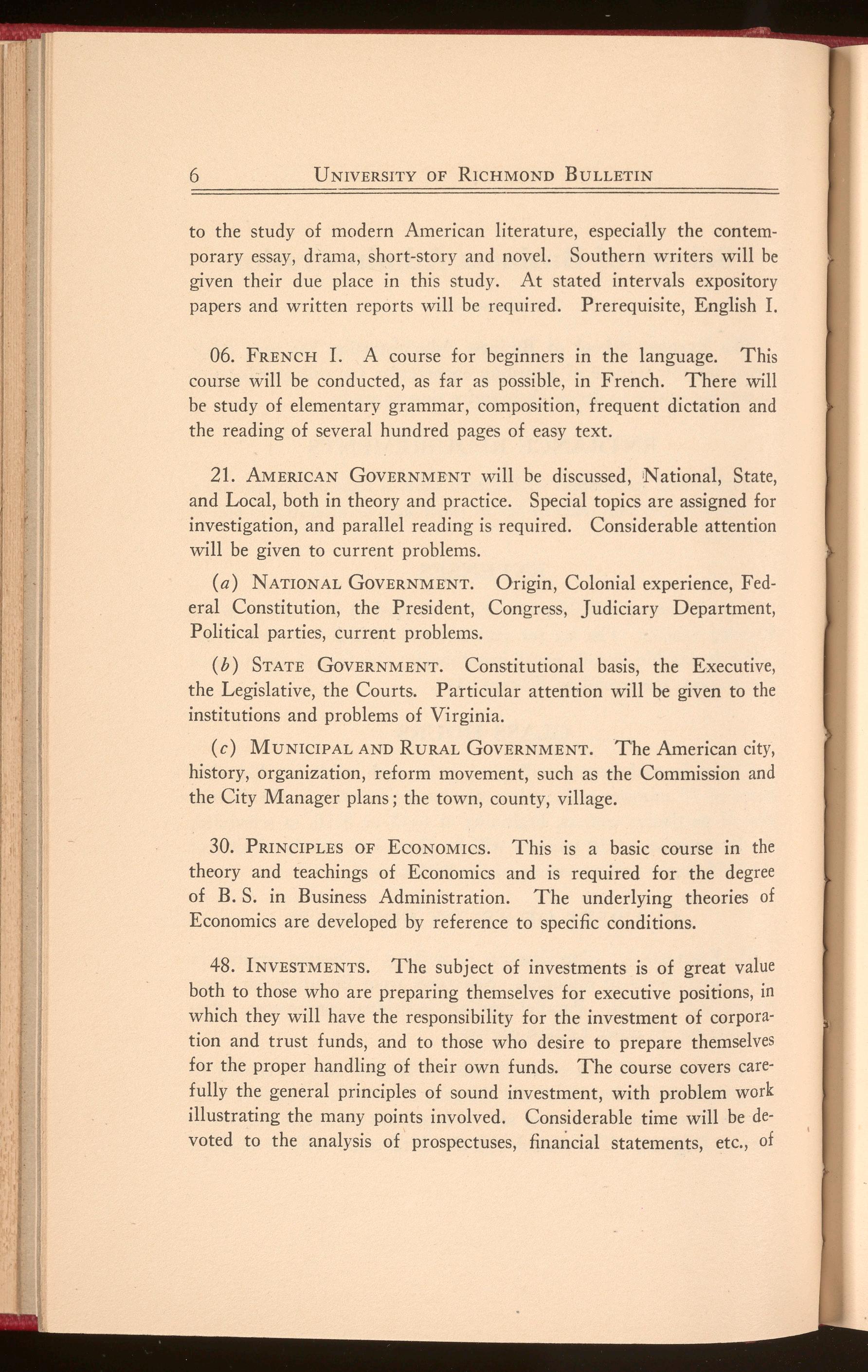
UNIVERSITYOF RICHMOND BULLETIN
to the study of modern American literature, especially the contemporary essay, drama, short-story and novel. Southern writers will be given their due place in this study. At stated intervals expositor y papers and written reports will be required. Prerequisite, English I.
06. FRENCH I. A course for beginners in the language. Thi s course will be conducted, as far as possible , in French. There will be study of elementary grammar, composition, frequent dictation and the reading of several hundred pages of easy text.
21. AMERICAN GovERNMENT will be discussed, National, State , and Local, both in theory and pr actice Special topics are assigned for investigation, and parallel reading is required. Considerable attention will be given to current problems
(a) NATIONALGOVERNMENT. Origin, Colonial experience, Federal Constitution, the President, Congress, Judiciary Department, Political parties, current problems.
(b) STATE GOVERNMENT. Constitutional basis, the Executive , the Legislative, the Courts. Particular attention will be given to the institutions and problems of Virginia.
(c) MUNICIPAL ANDRURAL GOVERNMENT. The American city, history, organization, reform movement, such as the Commission and the City Manager plans; the town, county, village.
30. PRINCIPLES OF EcoNOMICS. This is a basic course m the theory and teachings of Economics and is required for the degree of B. S. in Business Administration. The underlying theories of Economics are developed by reference to specific conditions.
48. INVESTMENTS. The subject of investments is of great value both to those who are preparing themselves for executive positions , in which they will have the responsibility for the investment of corporation and trust funds, and to those who desire to prepare themselves for the proper handling of their own funds. The course covers carefully the general principles of sound investment, with problem work illustrating the many points involved. Considerable time will be devoted to the analysis of prospectuses, financial statements, etc. , of
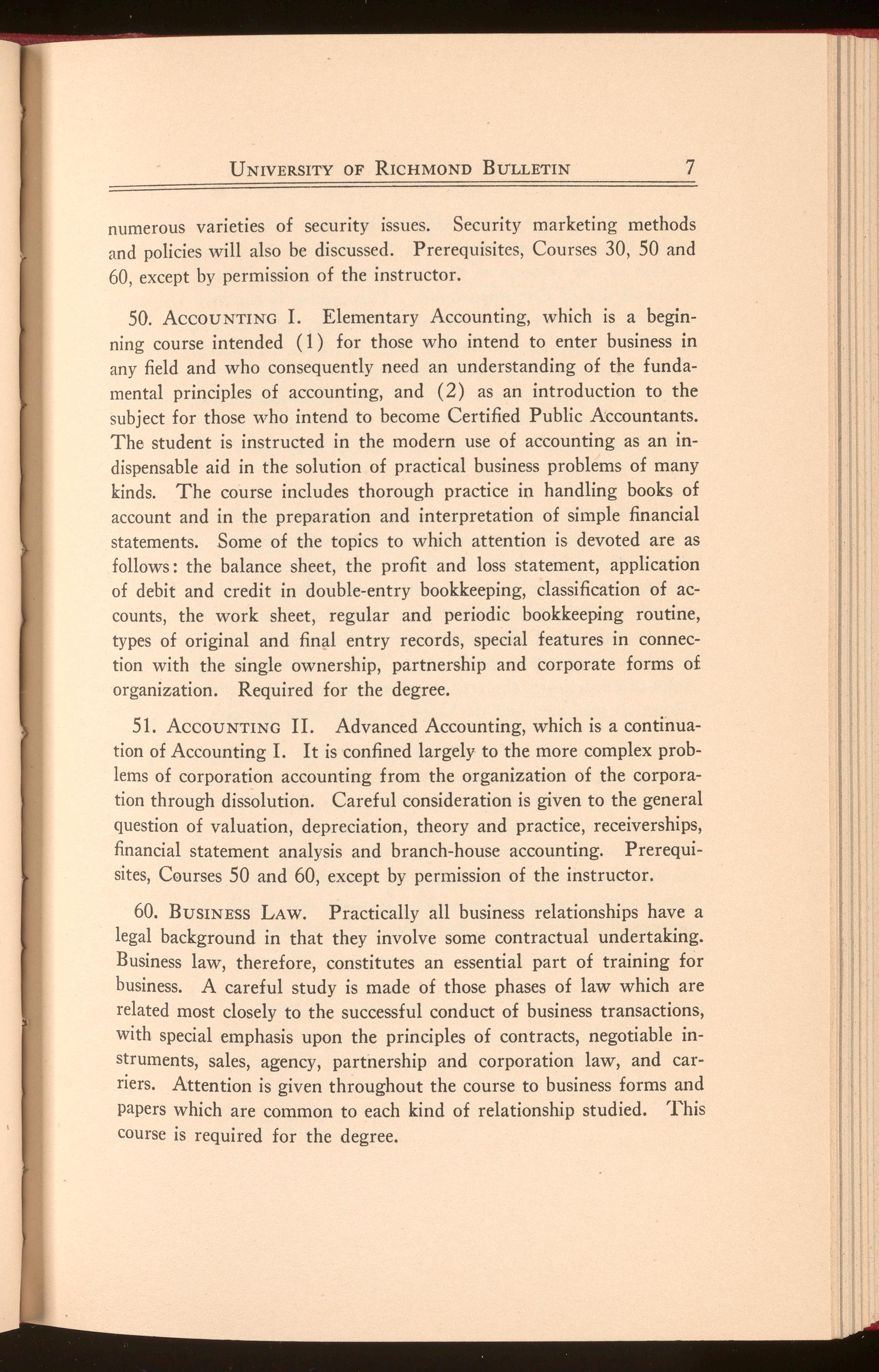
numerous varieties of security issues. Security marketing methods and policies will also be discussed. Prerequisites, Courses 30, 50 and 60 , except by permission of the instructor.
50. AccouNTING I. Elementary Accounting, which is a beginning course intended ( 1) for those who intend to enter business in any field and who consequently need an understanding of the fundamental principles of accounting, and (2) as an introduction to the subject for those who intend to become Certified Public Accountants. The student is instructed in the modern use of accounting as an indispensable aid in the solution of practical business problems of many kinds. The course includes thorough practice in handling books of account and in the preparation and interpretation of simple financial statements. Some of the topics to which attention is devoted are as follows: the balance sheet, the profit and loss statement, application of debit and credit in double-entry bookkeeping, classification of accounts, the work sheet, regular and periodic bookkeeping routine, types of original and final entry records, special features in connection with the single ownership, partnership and corporate forms of organization. Required for the degree.
51. AccouNTING II. Advanced Accounting, which is a continuation of Accounting I. It is confined largely to the more complex problems of corporation accounting from the organization of the corporation through dissolution. Careful consideration is given to the general question of valuation, depreciation, theory and practice, receiverships, financial statement analysis and branch-house accounting. Prerequisites, Courses 50 and 60, except by permission of the instructor.
60. BUSINESSLAW. Practically all business relationships have a legal background in that they involve some contractual undertaking. Business law, therefore, constitutes an essential part of training for business. A careful study is made of those phases of law which are related most closely to the successful conduct of business transactions, with special emphasis upon the principles of contracts, negotiable instruments, sales, agency, partnership and corporation law, and carriers. Attention is given throughout the course to business forms and papers which are common to each kind of relationship studied. This course is required for the degree.
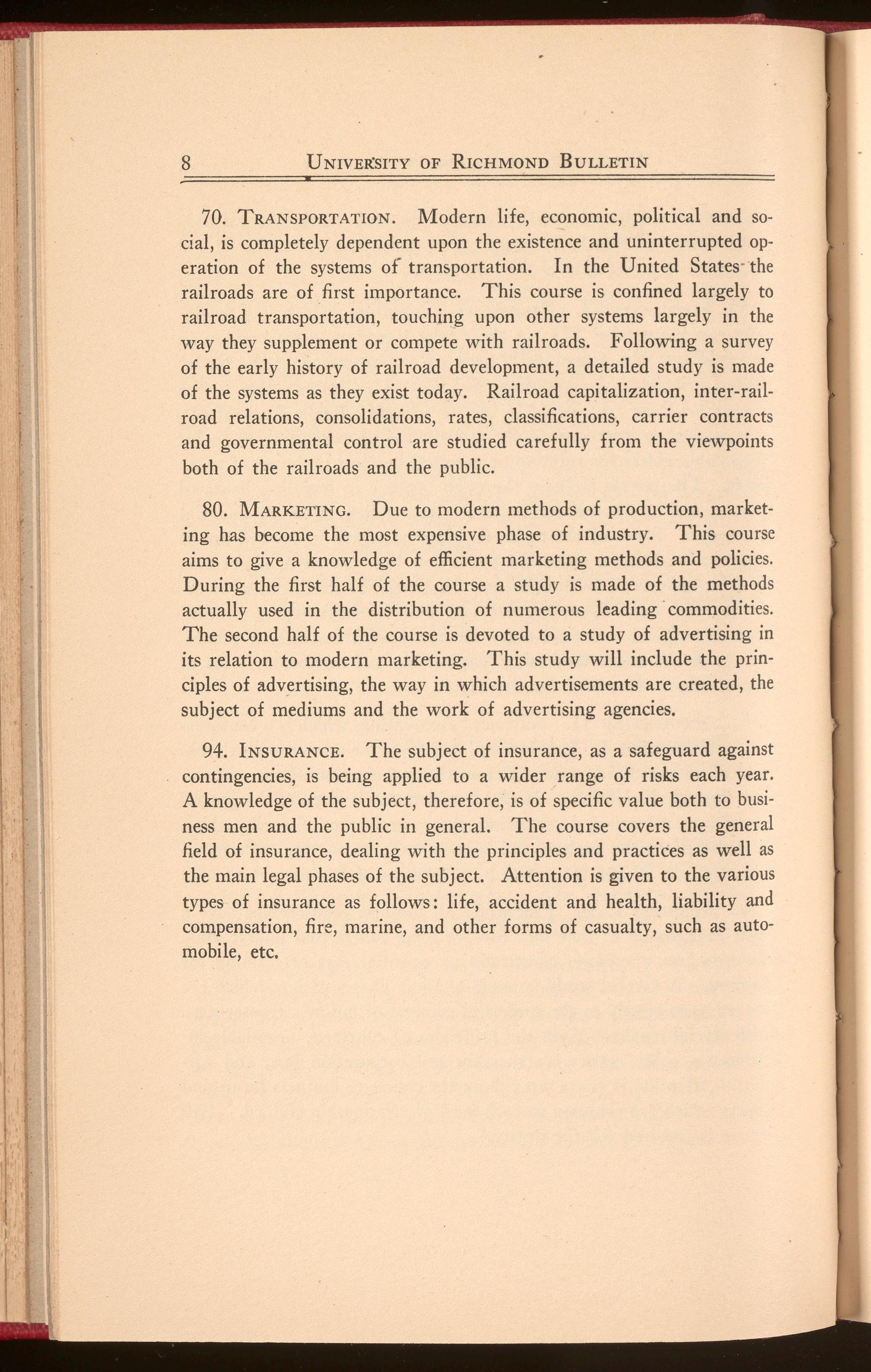
UNIVER'.SITYOF RICHMOND BULLETIN
70. TRANSPORTATION. Modern life, economic, political and social, is completely dependent upon the existence and uninterrupted operation of the systems of transportation. In the United States - the railroads are of first importance. This course is confined largely to railroad transportation, touching upon other systems largely in the way they supplement or compete with railroads. Following a survey of the early history of railroad development, a detailed study is made of the systems as they exist today. Railroad capitalization, inter-railroad relations, consolidations, rates, classifications, carrier contracts and governmental control are studied carefully from the viewpoints both of the railroads and the public.
80. MARKETING. Due to modern methods of production, marketing has become the most expensive phase of industry. This course aims to give a knowledge of efficient marketing methods and policies. During the first half of the course a study is made of the methods actually used in the distribution of numerous leading ·commodities. The second half of the course is devoted to a study of advertising in its relation to modern marketing. This study will include the principles of advertising, the way in which advertisements are created, the subject of mediums and the work of advertising agencies.
94. INSURANCE. The subject of insurance, as a safeguard against contingencies, is being applied to a wider range of risks each year. A knowledge of the subject, therefore, is of specific value both to business men and the public in general. The course covers the general field of insurance, dealing with the principles and practices as well as the main legal phases of the subject. Attention is given to the various types of insurance as follows: life, accident and health, liability and compensation, fire, marine, and other forms of casualty, such as automobile, etc.
